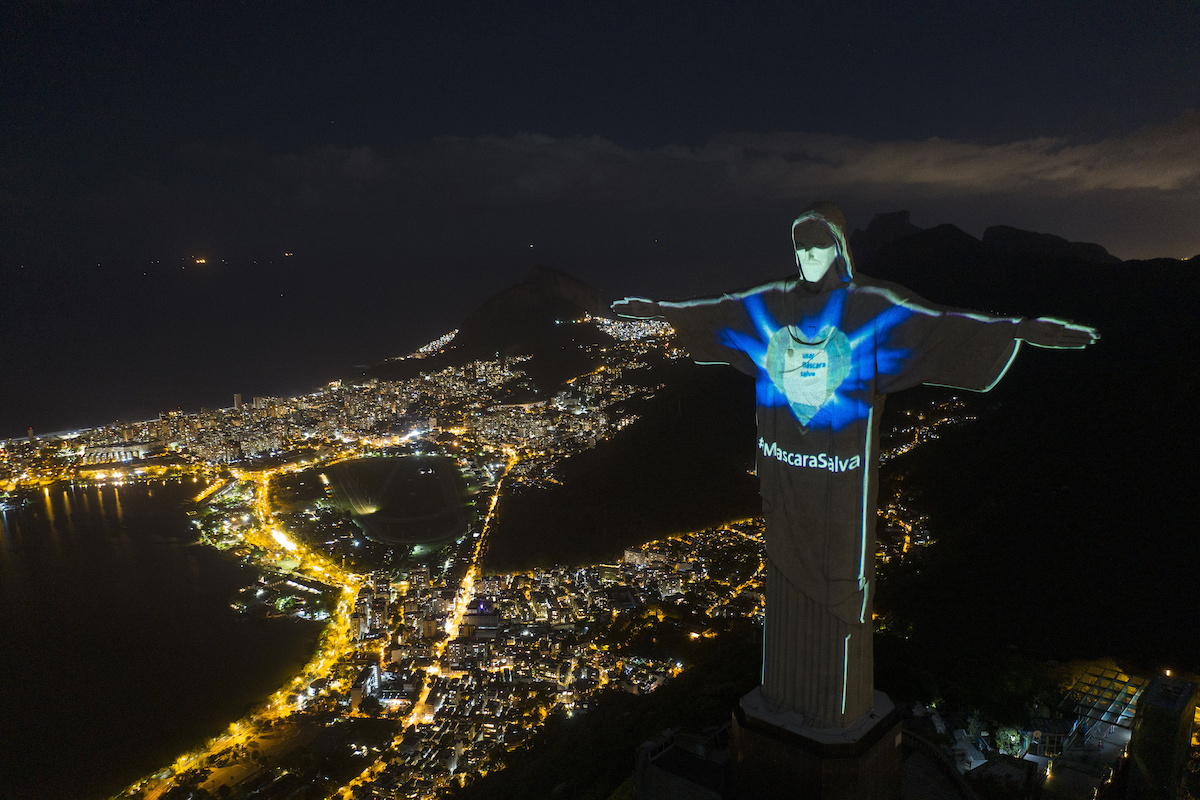

In this Sunday, May 3, 2020 photo, the iconic Christ the Redeemer statue is lit up as if wearing a protective mask and with a hashtag that reads in Portuguese: “Mask saves,” amid the new coronavirus pandemic, in Rio de Janeiro, Brazil. (AP Photo/Leo Correa)
By ALAN CLENDENNING and DIARLEI RODRIGUES, Associated Press
RIO DE JANEIRO (AP) — From the Amazon city of Manaus to the seemingly endless urban sprawl of Sao Paulo and Rio de Janeiro, freshly dug graves have been filling up quickly for weeks with the bodies of Brazilians killed by COVID-19.
Deaths from the coronavirus hit some cities so hard starting last month that officials were unprepared for the crush of bodies even though regional governments imposed measures aimed at halting the spread of the virus.
Meanwhile, President Jair Bolsonaro railed against business shutdowns as more harmful than the virus itself—and the country’s first lockdown was not ordered until this week, when there were already more than 7,000 deaths.
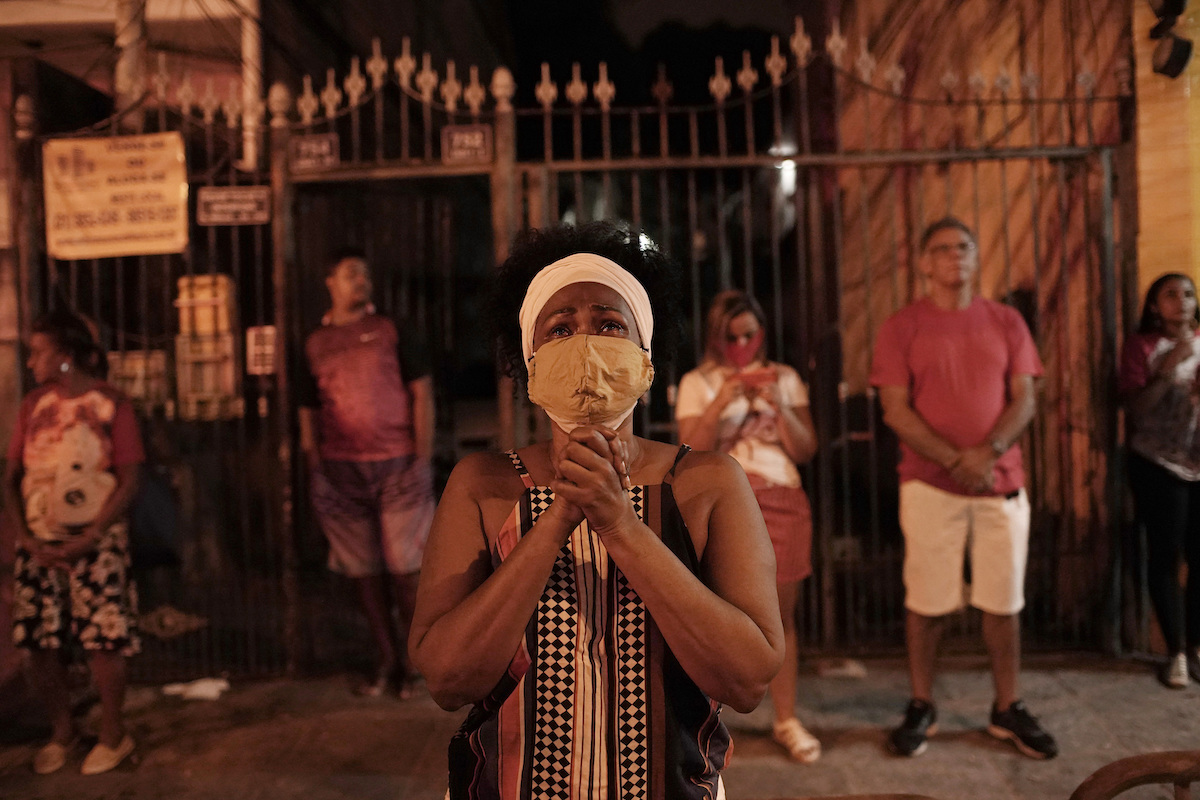

In this Thursday, April 23, 2020 photo, a woman wearing a mask as a precaution against the spread of the new coronavirus, prays illuminated by a street lamp outside the closed Saint George Church, marking the feast day for Saint George who is associated with bravery and resistance, in Rio de Janeiro, Brazil. (AP Photo/Silvia Izquierdo)
As the toll rose, Associated Press photographers and videojournalists fanned out across Latin America’s largest and most populous country to capture the agony experienced by regular Brazilians—at cemeteries, at hospitals and at a prison with rioting inmates, as well as at religious ceremonies and inside the homes of grieving relatives.
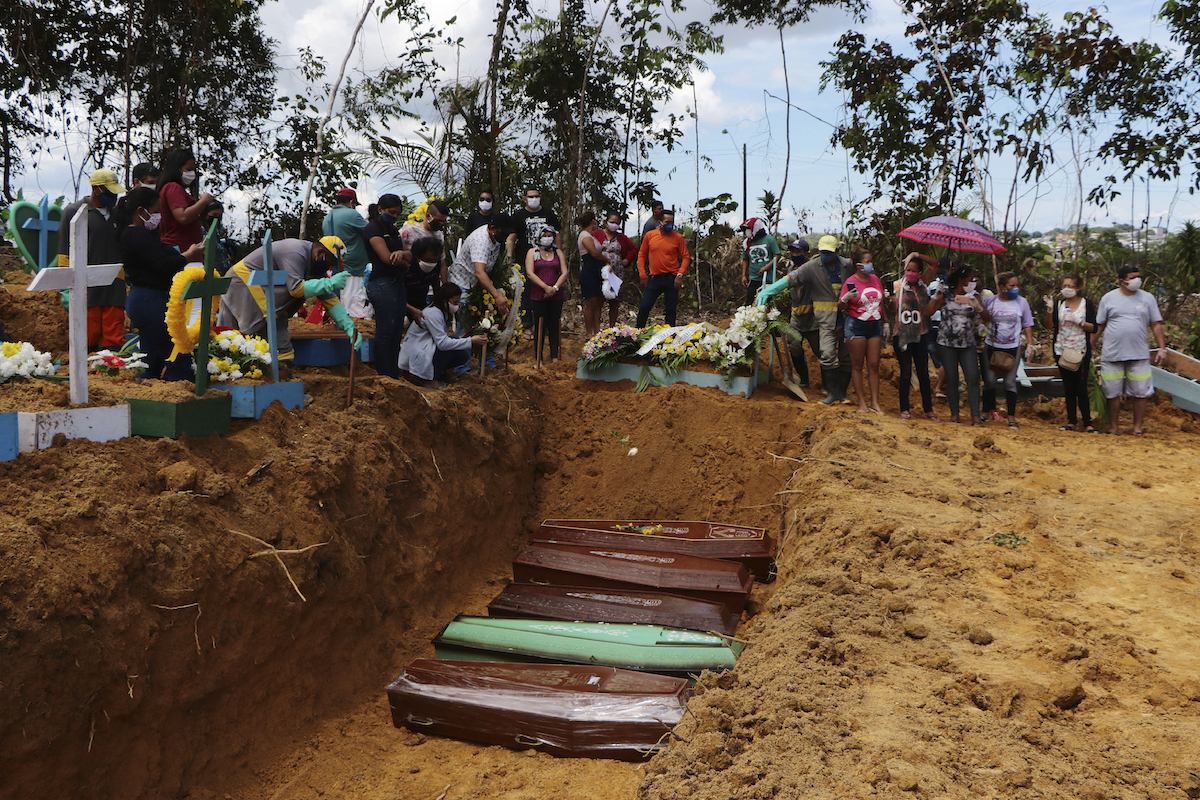

In this Tuesday, April 21, 2020 photo, relatives attend a mass burial at the Nossa Senhora Aparecida cemetery, in Manaus, Amazonas state, Brazil. (AP Photo/Edmar Barros)
They spent days traversing the narrow alleys of Brazil’s teeming slums, or favelas, where more than 11 million of the country’s 211 million people live in cramped conditions that experts fear could be decimated by virus outbreaks.
In one Rio favela, 31-year-old manicurist Leticia Machado and her husband, who does odd jobs, haven’t had work since business restrictions were imposed in the city. They’re relying on food donations from neighbors and a nearby cultural center to feed their seven children.
The city’s hospitals are close to capacity and health workers complain that they don’t have enough essential drugs to treat patients. Some workers had to buy their own protective gear at the public hospital where Taina dos Santos’ 56-year-old mother worked as a nursing assistant—until she died of the coronavirus late last month.
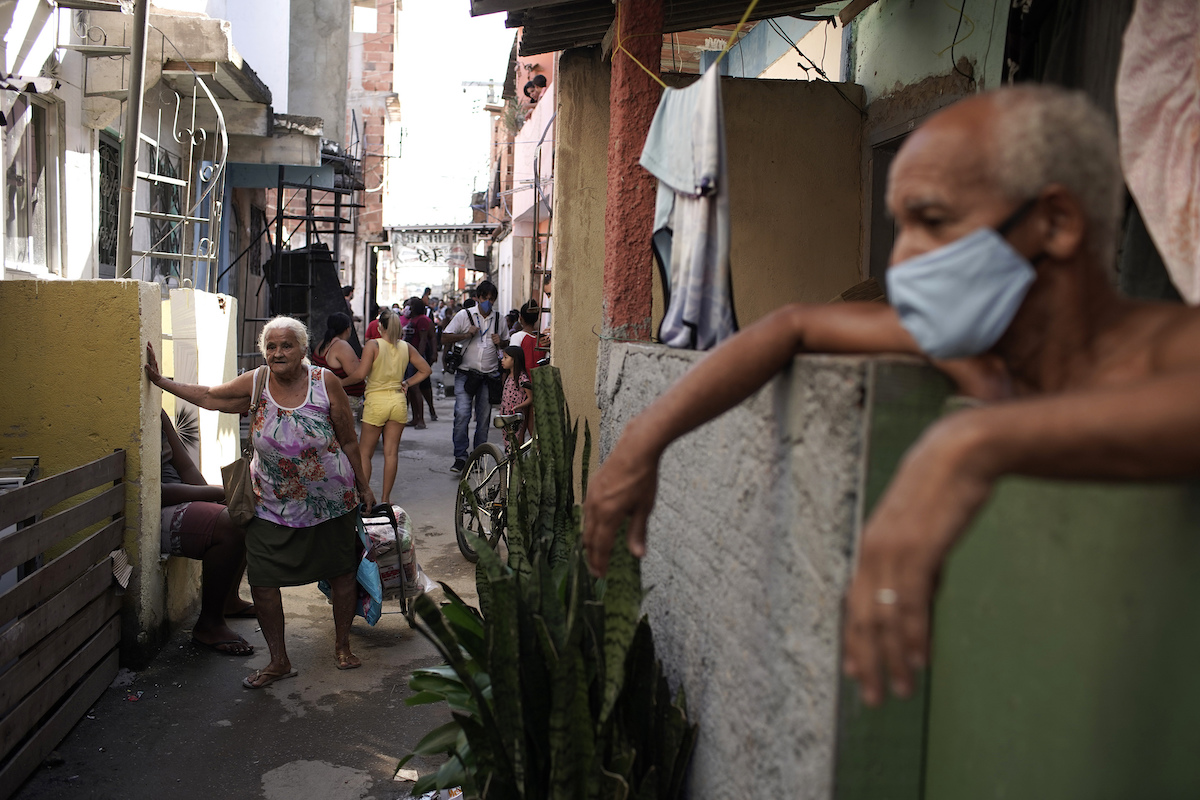

In this Tuesday, April 21, 2020 photo, an elderly woman pulls a grocery caddy filled with food donated by a non-governmental agency amid the the new coronavirus pandemic, in the Mandela favela of Rio de Janeiro, Brazil. (AP Photo/Silvia Izquierdo)
As gravediggers outfitted in white hooded suits stood holding their shovels at a hillside cemetery, dos Santos said goodbye to her mother’s casket.
“She gave everything to her job until the very end,” dos Santos said.
In Sao Paulo, an AP photographer captured an image a month ago of hundreds of newly dug grave sites that Bolsonaro called “fake news” and “sensationalism.” When the photographer visited again last week, the graves were filled along with dozens of new ones.
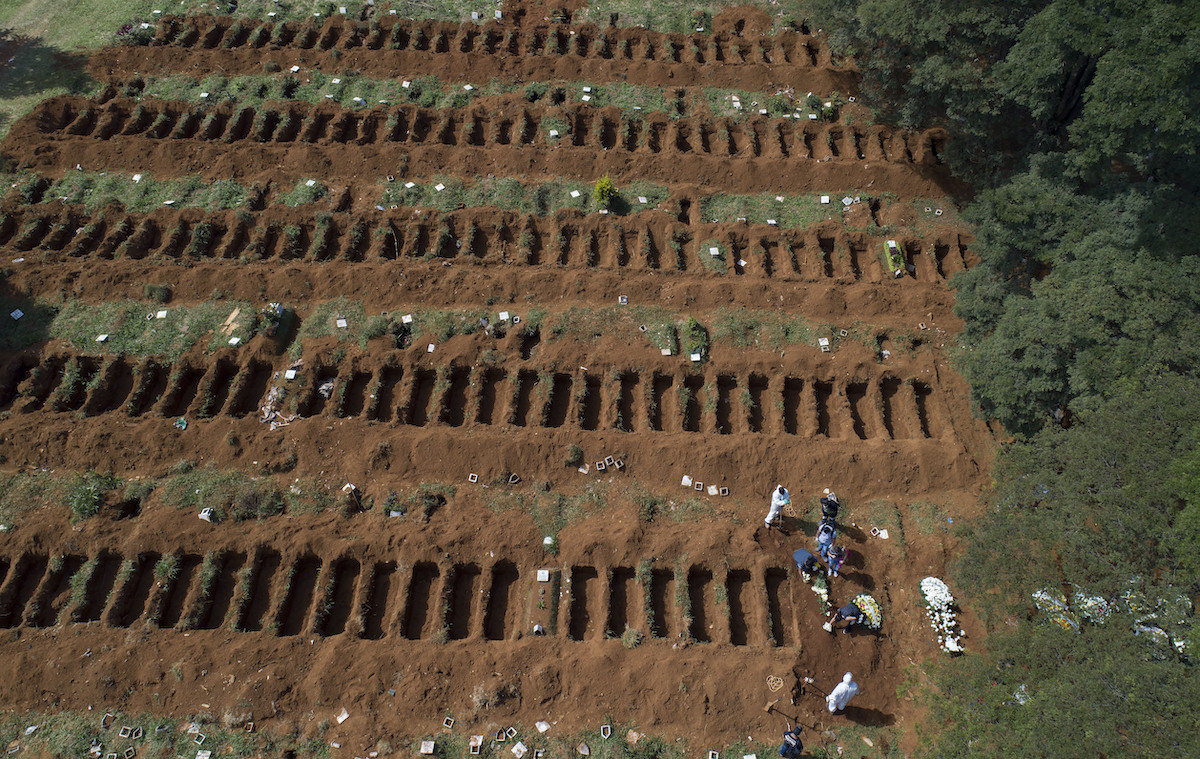

In this April 1, 2020, file photo, cemetery workers in protective gear bury a person alongside rows of freshly dug graves at the Vila Formosa cemetery in São Paulo, Brazil. (AP Photo/Andre Penner, File)
Bolsonaro, who has repeatedly called COVID-19 “a little flu” and refuses to wear a mask at his public events, has been criticized by protesters who lean from their apartment windows to bang pots and pans. He was pictured on graffiti on a Rio wall wearing a mask with the word “coward” on it, covering his eyes.
Bolsonaro’s take on the coronavirus angers Valter Azevedo Bonfim, whose mother died at a Rio hospital after he took her there suffering from what he believed were virus symptoms.
“Look how many hearses are leaving, and that guy is saying that it’s a little flu!” he said outside the hospital. “He goes and speaks on TV, telling people to go to the streets. How can we go to the streets? My mother went to the street and I buried her!”
In Manaus, a city of 2.2 million in the vast Amazon region, the death surge was so extreme that trenches for common graves were dug in one cemetery and caskets were piled atop each other. Some who wanted burials for loved ones opted for cremation instead.
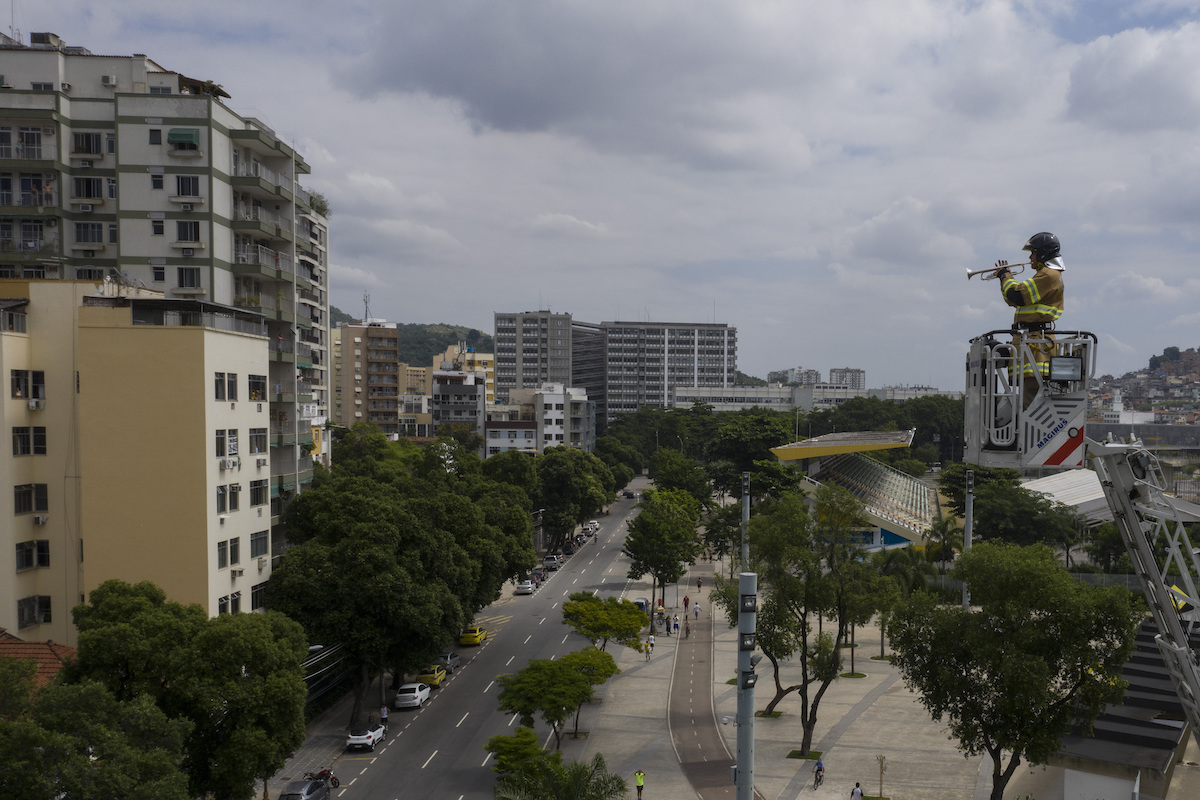

In this Sunday, April 5, 2020 photo, firefighter Elielson Silva plays his trumpet from the top of a ladder for residents cooped up at home, during a lockdown to help contain the spread of the new coronavirus, in Rio de Janeiro, Brazil. (AP Photo/Leo Correa)
In a poor working-class Manaus neighborhood, 86-year-old Raimundo Costa do Nascimento died at his home surrounded by family members and was pictured with eight of them as he lay dead in bed.
They had to wait 10 hours for his body to be retrieved.
***
Associated Press video producer Diarlei Rodrigues reported this story in Rio de Janeiro and AP writer Alan Clendenning reported from Phoenix. AP videojournalists Mario Lobão and Yesica Fisch and photographer Leo Correa in Rio de Janeiro contributed to this report.


